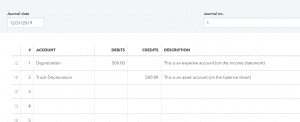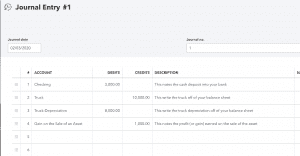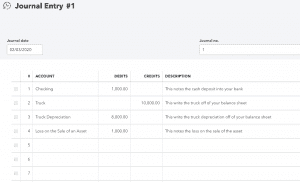QuickBooks QuickTips

The QuickBooks questions are flying in and are getting more advanced. I’m thrilled to know you’re thinking about how to get the most out of them. In this month’s newsletter, I’ll share two of the questions and answers.
Dear Julia,
I sold a truck and want to record the sale, along with depreciation from 2019, so I can take the money to the bank. Not sure how… help!
Sincerely,
Farmer Rob
Dear Farmer Rob,
Before I can offer directions, I need a little more information:
- How much did you purchase the truck for?
- How much did you depreciate it?
- What did you sell it for?
Ask your accountant the 2019 depreciation for the truck… and get that journal entry into QB. Let’s say it’s $500 (Totally making up numbers here):

Let’s say you purchased the truck for $10,000… and the total accumulated depreciation (after recording the 2019 depreciation) is $8,000. That means the book value of the truck is $2,000. The market value is a different story… and that’s the amount you can sell it for.
Scenario 1…
Let say you sold the truck for $3,000. That means you had a gain on the sale of the asset. You sold the asset for $1,000 more than its value. When you enter in the journal entry, you’ll want to right off the value of the truck, the accumulated depreciation and note the gain on the sale. Gain on the sale of an asset is an “other income” account.

Scenario 2
Let’s say you sold the truck for $1,000. That means you had a loss on the sale of the asset. You sold it for $1,000 less than its value. When you enter in the journal entry, you’ll want to right off the value of the truck, the accumulated depreciation and note the loss on the sale. Loss on the sale of an asset is an “other expense” account.

Dear Julia,
I want to record my mileage expense for using my personal car in QuickBooks so I can see the impact of having a vehicle on the different sales channels.
I know that if I declare the mileage rate for using my personal vehicle, I can’t also record the actual expenses incurred for repairs and fuel. I just purchase fuel for my car with our personal bank account, not my business’s bank account, and track my mileage generated from business use.
My question is: When I use my car to deliver flowers, is there a way to still reflect the expense in QuickBooks so I have a better view of the profitability with my flower enterprise? I know that if I were recording how much money I spent on fuel by each transaction then I’d have that information (albeit still inaccurate since we also use the vehicle personally), but since I’m just doing mileage rate I don’t have a specific transaction history to track and enter with date, dollar value, and purpose.
Sincerely,
Freddie Flower Farmer
Dear FFF,
In essence your question is: If you have $100 in mileage expense, how do you record the expense in QuickBooks since it’s a non-cash expense.
This is a fussy one…Because mileage isn’t considered an actual expense, even though it is a tax write-off, there is no direct mechanism to get the mileage expense into your P&L. You can certainly track mileage (Go to Company > Enter Mileage). You’ll need to “add a vehicle” first. You can then run a report to see the mileage expense.
If you want to see the expense represented in QuickBooks, then you need to kind of smush the round peg into the square whole. Think of it this way – you’re investing in the business when you loan the car to your business, and then you’re getting the investment back when you pay yourself back the mileage expense. In essence, you’re decreasing your equity in the business by recording the expense, and then increasing the equity by giving yourself the money back. So, it’s all a wash.
Nonetheless, I appreciate that you want to see the impact of the expense on your profitability inside of QuickBooks and not just for taxes.
You can do this with a journal entry. This will show the expense on your income statement, and you’ll have an increase in your owners equity account.
You can further add detail to the journal entry by noting the customer and the class (if using).
